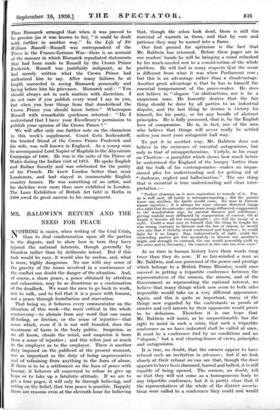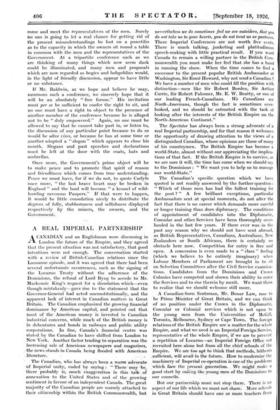MR. BALDWIN'S RETURN AND THE NEED FOR PEACE
NOTHING is easier, when writing of the Coal Crisis, than to deal condemnation upon all the parties to the dispute, and to show how in turn they have injured the national interests, though generally by blunders rather than by deliberate intent. But if this task would be easy, it would also be useless, and, what is more, highly dangerous. No one with any sense of the gravity of the issues involved in a continuance of the conflict can doubt the danger of the situation. And, of course, a sham peace, a peace obtained by attrition and exhaustion, may be as disastrous as a continuation of the deadlock. We want the men to go back to work, not to sulk, and to feel that it is a peace with honour, not a peace through humiliation and starvation.
That being so, it behoves every commentator on the situation of this week—the most critical in the whole 'controversy—to abstain from any word that can cause ill-feeling, or friction; -or the -sense of injustice—that sense which, even if it is not well founded, does the maximum of harm in the body politic. Suspicion, as we all know, clouds the mind, and suspicion is born from a sense of injustice ; and this refers just as much to the employer as to the' employee. There is another duty imposed on the publicist- at the present moment, one as important as the duty of being unprovocative and of refraining friim anything in the form of -abuse. If there is to be a settlement on the lines of peace with honour, it behoves all concerned to refuse to give up hope or to take up a fatalistic attitude. If we are to get a true pegee, it will only be through believing, and acting on the belief, that true peace is possible. Happily there are reasons even at the eleventh hour for believing that, though the ashes look dead, there is still the material of warmth in them, and that .by care and patience they may be nursed into a flame.
Our first ground for optimism is the fact that Mr. Baldwin has returned. Before these pages are in our readers' hands he will be bringing a mind refreshed by his much-needed rest to a consideration of the whole problem. He will find in many respects Voat the scene is different from what it was when Parliament rose ; but this is an advantage rather than a disadvantage. Another great advantage is that he has in himself the essential temperament of the peace-maker. He does not believe in " slogans "or abstractions, nor is he a suspicious man. He honestly desires that the fair thing should be done by all parties to an industrial dispute, and the last thing he desires is victory for himself, for his party, or for any bundle of abstract principles. He is fully possessed, that is, by the English love of compromise. He is, in fact, one of the men who believe that things will never really be settled unless you meet your antagonist half way.
To put it in another way, Mr. Baldwin does not believe in the existence of essential antagonisms, but only in that of misapprehensions. Carlyle, in his essay on Chartism—a pamphlet which shows how much better he understood the England of the hungry 'forties than did the bulk of his contemporaries—makes an impas- sioned plea for understanding and for getting rid of °' darkness, neglect and hallucination." The one thing that is essential is true understanding and clear inter- pretation :— " Perfect clearness on it were equivalent to remedy of, it. For, as is well said, all battle is misunderstanding ; did the parties know one another, the battle would cease. No man at bottom means injustice ; it is always for some obscure distorted image of a right.that he contends: an obscure image diffracted, exaggerated, in the wondorfulest way, by natural dimness and selfishness ; getting tenfold more diffracted by exasperation of contest, till at length it become all but irrecogruzable ; yet still the image of a right. Could a man own to himself that the thing he fought for was wrong, contrary to fairness and the law of reason,- he would own also that it thereby stood condemned and hopeless ; he could fight for it no longer. Nay, independently of right, could the contending parties get but accurately to discern one another's might and strength to contend, the one would peaceably yield to the other and to Necessity ; the contest in this case too were over."
• At no time in human history have these words rung truer than they do now. If so fair-minded a man as Mr. Baldwin, and one possessed of the power and prestige which belongs to a British Prime Minister, could once succeed in getting a tripartite conference between. the • representatives of the owners, the miners, and of the Government as representing the national interest, we believe that many things which now seem to both sides impossible would take on a very different appearance. Again, and this is quite as important, many of the things now regarded by the contestants as proofs of sinister and evil intents by their opponents would prove to be delusions. Therefore it is our hope that Mr. Baldwin will insist, as he unquestionably has the right to insist in such a crisis, that such a tripartite conference as we have indicated. shall be called at once. It must be a conference tied by no conditions and no "slogans," but a real clearing-house of views, principles and antagonisms. . • - It is true, no doubt, _that the owners appear to have refused such an invitation in advance ; but if we look closely at-their refusal we can see .that, though the door appears to have been slammed,, barred and bolted, it is still capable of being opened. The owners, no doubt, tell us that they will not come as a homogeneous body to any tripartite conference, but it is pretty clear that_ if the representatives of the whole of the district associa- tions were called to a .conference they could and would come and meet the representatives of the men. Surely no one is going to let a real chance for getting rid of the present misunderstandings be lost on a punctilio as to the capacity in which the owners sit round a table in common with the men and the representatives of the Government. •At a tripartite conference such as we are thinking of many things which now seem dark could be illuminated, and many men and proposals which are now regarded as bogies and hobgoblins would, in the light of friendly discussion, appear to have little or no substance.
If Mr. Baldwin, as we hope and believe he may, summons such a conference, we sincerely hope that it will be an absolutely " free forum." His invitation must per se be sufficient to confer the right to sit, and no one must have a right to object to the presence of another member of the conference because he is alleged not to be " duly empowered." Again, no one must be allowed to say that he cannot take part in, or listen to, the discussion of any particular point because to do so would be ultra vires, or because he has at 'some time or another adopted a " slogan " which appears to close his mouth. Slogans and past speeches and declarations must be left at the door with the coats, hats and umbrellas.
Once more, the Government's prime object will be to make peace and to promote that spirit of reason and friendliness which comes from true understanding. Peace we must have, for if we do not, to quote Carlyle once more, " the last brave heart may be broken in England " and the land will become " a kennel of wild- howling ravenous Paupers." If that were to happen, it would be little consolation nicely to distribute the degrees of folly, stubbornness' and selfishness displayed respectively by the miners, the owners, and the Government.































































 Previous page
Previous page